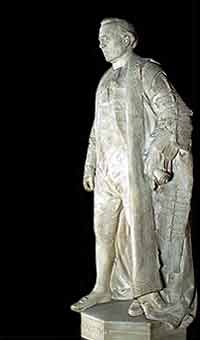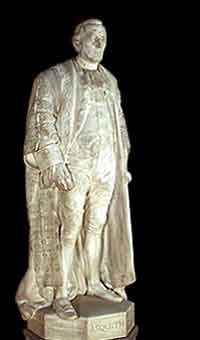Herbert Henry Asquith, 1st Earl of Oxford (1852-1928)
Liberal Prime Minister 1908-1916
© 2007
Armchair Travel Co. Ltd. - This page may be used for non-commercial purposes
ONLY!
![]()

[ Play
Narrated and Animated Movie ! ] For twenty years he has held a season ticket on the line of least resistance, and gone wherever the train of events has carried him, lucidly justifying his position at whatever point he has happened to find himself.
Herbert Asquith, the son of a Yorkshire wool merchant, was educated in London and called to the Bar before deciding on a political career. He entered Parliament through the general election of 1886 as the Liberal member for East Fife. During the parliamentary investigation of Charles Parnell in 1888 Asquith rose to national distinction as Parnell's junior defence attorney. His abilities soon became recognised by his superiors, and in 1892 he was appointed as Home Secretary by Gladstone.
From 1895 the country saw ten years of Conservative administrations. During this period Asquith was out of office and returned to the Bar. In 1905 the Liberals swept back into power with a strong majority, and Asquith was appointed as Chancellor of the Exchequer. He soon set about introducing social reform, and succeeded in establishing pensions for most of those over 70 years of age, and enforced a higher rate of tax on unearned income. In 1908 Asquith succeeded Henry Campbell-Bannerman as the new Prime Minister.
Asquith started his tenure by following Gladstone's policy of attacking the power of those in the House of Lords. Historically the Lords were always obstructive of Liberal policy making. Crises began in 1909 when the Lords rejected the government's budget. Asquith dissolved Parliament, and there followed a bitter battle between the Liberals and Lords. Asquith enlisted the support of the Irish members in return for the introduction of a bill preventing the lords' veto. In April 1910 he introduced the Parliament Bill, consolidating the power of the Commons and thus reducing that of the Lords. The bill was successfully passed in 1911.
The Parliament Act drastically reduced the power of the Lords, and so without their veto Asquith was able to introduce his Home Rule for Ireland Bill. Unsurprisingly, the bill sparked much controversy, and became an issue of national conflict for the next three years. It met bitter resistance in Ireland, and led to the brink of civil war. Pressure increased during 1913 and 14 and matters were only averted by the outbreak of World War I. The rise of war in Europe served only to accentuate the problems at home. Asquith avoided declaring war until the public became aroused, but after provocation from the Bosnian crisis in June 1914 Britain declared war against the Germans. In 1915 Asquith formed a coalition government with Balfour, Bonar Law, Carson, Henderson, Lord Kitchener and Lloyd George. Unfortunately the coalition was not successful, and because of heavy war casualties, severe financial problems and the war dragging on, the government soon became unpopular.
Opposition to Asquith's 'calmness' in this situation grew, many feeling that he was not handling the war in a suitably effective manner. In December 1916, the opposition faction in government forced him to resign in favour of his Minister for War, David Lloyd George. Asquith remained in Parliament, but was out of office having refused to serve under Lloyd George. He also declined the king's offer of the Garter, and in the election of 1918 Asquith eventually lost his seat at East Fife.
In 1920 Asquith returned to the Commons as an 'Independent Liberal', and after the fall of Lloyd George's government in 1922, he united the Liberal Party once more. However, after a Labour victory in 1924, Asquith gradually lost support and eventually lost his seat. In 1925 King George offered him a peerage and Asquith took his seat in the Lords although he was 72 years of age. He died in 1928.
Asquith worries too much about small points. If you were buying a large mansion he would come to you and say: 'Have you thought that there is no accommodation for the cat?'
When asked why the War Office kept three sets of figures, he replied:
... A forensic gladiator who never made a heart beat quicker by his words, and who never by any possibility brought a lump into his hearer's throats.
...the P.M. is absolutely devoid of all principles except one - that of retaining his position as Prime Minister. He will sacrifice everything except No. 10 Downing St. D [avid Lloyd George] says he is for all the world like a Sultan with his hareem of 23, using all his skill and wiles to prevent one of them from eloping.
In Asquith's case the inveterate lack of ideals and imagination seems really unredeemed; when one has peeled off the brown-paper wrapping of phrases and compromise, one finds - just nothing at all.
[ Virtual
Tour ] [ Main Topics
Index ]
- David Lloyd George, c. 1916.



Additional Information on
Herbert Henry Asquith, 1st Earl of Oxford (1852-1928)
Liberal Prime Minister 1908-1916
QUOTATIONS
- David Lloyd George, Letter to Lord Riddell, 1915.
One to mislead the public, another to mislead the Cabinet, and the third to mislead itself.
- W.T. Stead, in Review of Reviews, 1906.
- Frances Stevenson (Lloyd George's mistress), Diary, 30 November 1916.
- Lytton Strachey.
Explore-Parliament.net: Advanced Category Search
Keyword Categories:
_Peer
_Man
_Person
_Politician
_Object_Portrait
_Object_Artwork
_Object_Sculpture
_Artist_Merrifield_and_Bayes
_Asquith